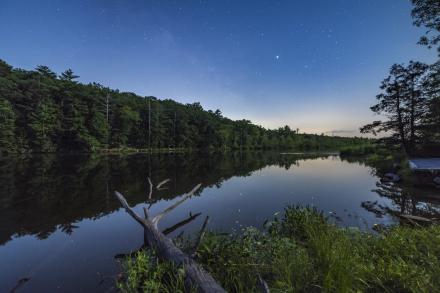
New York has 70,000 miles of rivers and streams, 4,000 lakes and ponds, 2.4 million acres of wetlands and extensive aquifers. These abundant resources need our protection to remain clean. Human activities leave behind materials like pesticides, pet waste, trash and even loose soil that can wash into our waters and pollute them. Even where you don't see a stream or lake, streets, roadside ditches and underground storm sewers carry polluted runoff into the closest waterbody. The good news is that your positive actions can do much to protect New York's waters.
- Return used motor oil for recycling
- Never pour oil onto the street or down a storm drain. It'll wash, untreated, into the nearest waterbody. Most New York service stations accept used oil. Some municipalities also collect used oil as part of a community household hazardous waste collection.
- Use a commercial car wash
- Or wash your car on the lawn to keep dirty, soapy water from flowing into storm drains and eventually into your local streams and lakes.
- Sweep sidewalks and driveways
- Hosing yard debris off hard surfaces just washes it into storm drains. Compost yard waste instead.
- Fight mud
- Cover areas of bare soil with mulch, or plant grass or ground covers to keep rain from washing soil into storm drains, ditches, streams and lakes. Fine soil particles, or sediment, can suffocate fish and destroy their habitat.
- Avoid using lawn fertilizers that contain phosphorus
- Test your lawn first to see if it needs phosphorus. Phosphorus that is not needed by turf grass is often carried by rain into nearby waterbodies where it can cause serious environmental problems. The new Dishwasher Detergent and Nutrient Runoff Law severely restricts or prohibits the use of phosphorus-containing lawn fertilizers.
- Leave an unmowed buffer next to streams and lakes
- A buffer strip filters the pollutants carried by storm runoff, stops erosion of banks and helps prevent flooding downstream. A buffer of native plants also benefits wildlife and beautifies your backyard.
- Flush responsibly
- Rather than flushing, dispose of cleansers, beauty products, medicine, auto fluids, paint, and lawn care products at a local household hazardous waste facility. Take pharmaceuticals to special collection locations.
- Use the trash, not the drain
- Dispose of excess fats and grease, diapers and personal hygiene products in the garbage can. These materials can clog pipes and cause raw sewage to overflow.
- Block the buzz
- Prevent mosquitoes from breeding by eliminating standing water in old tires and clogged gutters, or use dunks containing the larvacide Bti (a bacteria that targets mosquitoes). Empty and refill kiddie pools and pet water dishes at least once a week. When sitting outside, place multiple citronella candles close by. Protect infants and toddlers with light-colored, loose-fitting clothing and by draping netting over strollers. In spring, mount bat and purple martin houses to encourage these mosquito-eating machines. (Note: A chemical repellant such as DEET may be necessary where mosquito-borne diseases are likely.)
Volunteer at Local Watershed Association
Here are some of the ways you can become involved:
- Join a Stream Team: To watch for sources of pollution, illegal dumping, bank erosion and to monitor the condition of the river.
- Participate in a River Clean-up Day: Watershed associations often need volunteers to help remove the debris that accumulates in the water and along the banks of rivers.
- Water Quality Monitoring: Information on flow rate, temperature and other variables is collected by volunteers. Individual water samples are taken and brought to labs to be analyzed. This vital information is used to track the overall health of the water bodies.
Contact for this Page
DCEE, Bureau of Digital Services
625 Broadway
Albany, NY 12233
Phone: 518-402-8013
(Photo from NY State Department of Environmental Conservation)